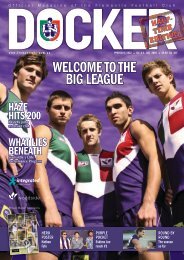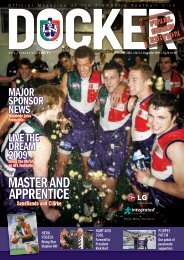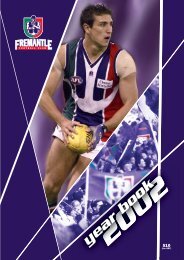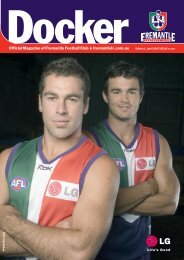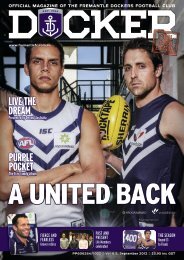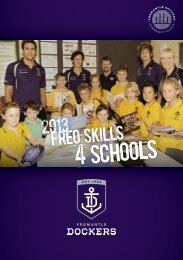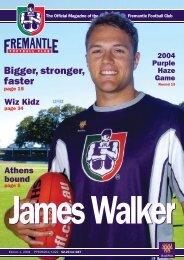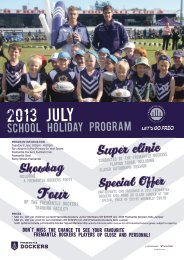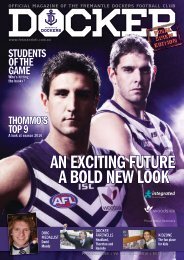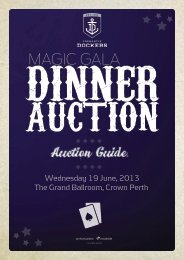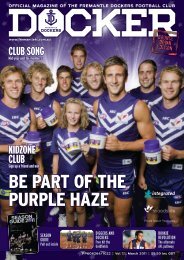FD36a Docker JUL05-REV.indd - Fremantle Football Club
FD36a Docker JUL05-REV.indd - Fremantle Football Club
FD36a Docker JUL05-REV.indd - Fremantle Football Club
Create successful ePaper yourself
Turn your PDF publications into a flip-book with our unique Google optimized e-Paper software.
Dennis ComettiFor over three decades Dennis Cometti has become synonymous withour great game. More than just a voice behind the microphone, theaward winning commentator has been intimately involved with footballat all levels and shares his unique perspective on footy broadcastingand his love of the game.You’ve been watching football from the best seatin the house for a long time do you think thegame is in a healthy state at the moment?Yes, I think it is. It has improved on most levels,some people have got concerns about some of thetactics being employed at the moment (floodingetc) but by and large it’s in very good shape andcertainly people are voting with their feet.What has been the biggest positive and negativethat you’ve seen?Certainly the biggest positive has been thenational competition, I think a lot of people haddoubts about it, particularly people in WesternAustralia, and given the sad state of football justbefore the formation of the West Coast Eagles ithas worked out remarkably well and now we havea world class competition. As far as negativesgo the fact that there is no Perth team, I reallyfeel strongly about that. Part of the history ofWA football is West Perth, East Perth and Perthand as a person that lives in Perth I don’t thinka team should have been allowed to be called theWest Coast Eagles, I think that means very littleand we should have been proud of the footballheritage we have and had a Perth team.Where did your love for the game begin?It began at Perth Oval back in the mid to late50’s. The first game I went to was between East<strong>Fremantle</strong> and East Perth and at that stage EastPerth were an emerging powerhouse with PollyFarmer and Jack Sheedy was coaching. I spentmost of the afternoon collecting bottles but East<strong>Fremantle</strong> won the game and they became myteam growing up. I think back and I can measuremy childhood through various experiences thatinvolve football.Before becoming the voice of football you hada more hands on role?I came up through the under 18’s competitionand actually wanted to play with East <strong>Fremantle</strong>but that didn’t eventuate because I was boundto West Perth. In my final year of under 18’s Iwas called up to play a reserves game with WestPerth so I started pretty young and was finishedwhile I was still young. I got into radio, had a fewinjury problems and really just drifted away fromthe game as a player because of other priorities.I started coaching in the Sunday League whichwas a healthy competition during the late 70’s andearly 80’s and had some success there and as aresult was offered the West Perth coaching job andended up doing that for three years from 1982-84.At that stage you were working as a sportscommentator at the ABC, how did you combinethe two roles?I was doing a preview to the WAFL on Fridaynight and broadcasting games that West Perthweren’t involved in so when people ask me aboutEddie McGuire I’m really the last person to askbecause I’ve been down a similar road albeit ona smaller stage.Fans like to think Broadcasters are unbiased,does that mean you can’t have a favourite team?Probably to a point but the team I barrack foris West Perth so it’s an easy answer for me.I suppose I barrack for the underdogs, I have a softspot for <strong>Fremantle</strong> – not because this is for theirmagazine – but I’d like to see them do well and asoft spot for Melbourne because they were thefirst team I barracked for as a kid and I spent sometime at the Western Bulldogs. I don’t go to thefootball hoping that somebody wins but if thoseclubs do win it’s nice to see them getting closer tosomething that you hope all clubs can experience.Can you remember the last time you went to agame just to sit and watch?It was last year and I went to see Collingwoodplay Melbourne on the Queens birthday publicholiday at the MCG.Were you able to just watch or did you findyourself analysing the game?I’m not sure if I analyse the game when I’mbroadcasting (laughs). I actually, and this is nofault of the game, but I find myself not feeling somuch a part of the game as when I’m broadcasting.Broadcasting really makes you feel involved andwhen you go as a spectator there are a lot of otherthings going on that can break your concentration,but I do enjoy going to the football but not so withthe cricket. I haven’t been to a days cricket playsince I stopped broadcasting the game becauseI find that while cricket was a great game tobroadcast I didn’t enjoy going as a spectator.You’ve broadcast on television, radio and writtenfor newspapers, do you have a preferred medium?Television, no question, I think the tempo suitsme best. You get a chance to be more expansiveand say a little more because there’s not as muchtime put into description because people can seewhat is going on and I believe it gives you morefreedom.Do you think the media scrutiny that clubs andplayers are under now is too intense?I do, I think we’ve got to the stage where there isno stopping it and the trivial, particularly in citieslike Adelaide and Perth where you have only twoteams, becomes far too important and I don’tknow what can be done about that.How much time do you put into preparing fora game?I’d say 10 to 12 hours per game, perhaps a littleless for a Sunday game, while Friday night gamesget the central focus. These days I only do twogames each weekend after doing three lastseason (including a radio broadcast on Saturday)and it was too much. I enjoy watching games offooty and I have a gymnasium at home which I’mquite proud of and I have a TV and video set up inthere and I get on the stationary bike every dayand watch a half of football.What does a typical week for you involve?During the football season it’s very regimented,same old, same old. Generally head to Victoria onFriday morning to do the game broadcast that nightthen spend Saturday in Melbourne before flyinginterstate on Sunday to call another game for theNine Network. I’m home usually on Sunday nightand then read the sport on Channel 9 Monday toThursday. Every day is a working day and thereare no days off during the winter not that I’mcomplaining because it’s a good lifestyle and onethat doesn’t hold too many curve balls because Iguess I’m someone who likes to have a routine.We hear there is some tricky driving involved ingetting you from your hotel on the eastern side ofMelbourne to Telstra Dome on Friday nights?It’s tough to get from where I stay to the Dome withall the traffic at that time of night, particularly inthe wet but my driver and I do some rather uniquethings to take the traffic out of play, I won’t revealthe details but it’s really bizarre actually (laughs).He’s got this route that takes a bit of beating!A lot of football fans think you have the best jobin the world, how much do you enjoy it?If you love the game and you’re fortunate enoughto work with people you like you are very lucky.The downside is the travel. It really is living in twocities during the winter, four days in Perth andthree days in Melbourne.Facing20Dennis ComettiAspiring broadcasters look to you for inspiration,was there anyone you based your broadcastingskills on?I probably took something from all of the WAradio broadcasters I listened to as I was growingup. Guys like Frank Sparrow, Oliver Drake-Brockman, Jack Sweet and many more. As aresult when I first arrived in Melbourne therewas some opposition to the way I called thegame because they had developed their ownstyle and I was bringing in something differentfrom the west. Some of the terminology thatI used was unfamiliar to them and probably thelanguage of football changed to become farmore cosmopolitan.You are famous for your one-liners, do you preparethem or are they off the cuff?It really is a combination, some are prepared– they’re things I think about and they lie in waitand if get the right set of circumstances you tossthem out there. Some you jot down and you knowyou’ll get the chance during the game to usethem. I read a lot of oversees commentators andjournalists and you get some ideas about thingsthat amuse you and may amuse other people.You’ve managed to write a few books, do youcount yourself as an author?I don’t know how authors make any money, myexperience with books is that it’s a lot of timefor very little return but the last one wasn’t toodifficult because it was just putting the one-linersdown and getting a collection of them. The bestthing was other people had collected them for meon the internet so I wrote them down from there!You’ve clocked up thousands of kilometres in theair travelling to football games, have you had anybad experiences?In 2003 our plane was late and we missedthe start of the game in Adelaide. My fellowcommentator Dwayne Russell had his father pickus up from the airport and rush us to the ground.Dwayne’s father loved driving at speed and howwe survived the trip I don’t know, anyone elsedriving we would have been there at three quartertime but he got us there in the first quarter. Therewere people shaking their fists at us along theway and honking, it was a near death experience.Aside from AFL are there other sports you enjoy?Most American sports I have a keen interest in.I love watching golf on television and think it’sperhaps the best sport there is on TV.What does the future hold for Dennis Cometti?It rides very much on what happens with the AFLtelevision rights and if things change dramatically,and I’m not sure they will, we’ll have to see wherethe cards fall. I’ve been pretty lucky and haveenjoyed the last 20 years broadcasting AFL on TVbut you never know what’s in the future.fremantlefc.com.au July 2005 <strong>Docker</strong> 37



